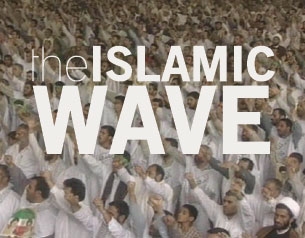The Islamic Wave
We unearth the roots of Muslim discontent and explore the resonance of the Palestinian question for the whole Arab world. Islam is the world's fastest growing religion. Should we fear it? We find a faith not just at odds with the West, but with itself.
 Muslims world-wide are backing the Palestinians in their latest uprising. In this timely documentary, we unearth the roots of Muslim discontent and explore the resonance of the Palestinian question for the whole Arab world. Islam is the world's fastest growing religion. Should we fear it? We find a faith not just at odds with the West, but with itself.
Muslims world-wide are backing the Palestinians in their latest uprising. In this timely documentary, we unearth the roots of Muslim discontent and explore the resonance of the Palestinian question for the whole Arab world. Islam is the world's fastest growing religion. Should we fear it? We find a faith not just at odds with the West, but with itself.
To the West, the boys taking on the Israeli army in Gaza are Muslim fanatics. "We fight for Hamas because if we get martyred we will go to heaven. We will throw stones until our land is returned", says 12 year old Azmi. In Jerusalem a Palestinian woman wails as her home is bulldozed. Israel's policy of eroding Palestinian land continues, despite the peace process. "Is that fair?" she screams. Israel was created with Western acceptance. It's now the fiercest flash-point of Islamic anger towards the West.Sudanese spiritual leader Dr. Hassan Turabi, a man accused of being at the heart of Islamic extremism, explains that Palestinian suffering fires Muslim indignation world-wide. "The Israelis sometimes march onto mosques while people are praying and shoot them by the tens. If people go about shooting people, any human being will in defence go take a gun and hunt someone down." It's a veiled reference to one of the many Islamic extremist groups active in the Middle East and elsewhere. They merge politics and an absolute view of religion to demand political change in Muslim countries around the world. From the mosques of Gaza to the chai houses of Damascus, young Arabs are told of a Western conspiracy against Islam. From the Crusades and colonisation to the Gulf War young Muslims are told that history proves Islam is under attack. And when Islam comes under fire the Muslim holy book, the Qur'an, is firm. Muslims must rise to protect their religion.
We examine the Islamic states: Sudan, Afghanistan and Iran. Sudan is Africa's Islamic powerhouse, with training camps for guerrilla groups like Hamas and Hezbollah. Hassan Turabi denies involvement in international terror, yet endorses Islamic revolution. Nevertheless, Sudan's constitution is fairly mild, unlike Afghanistan, home to the most primitive form of Islam in the world. The Taliban forced women out of Afghan society and introduced rules out of the dark ages. The Taliban's harsh interpretation of Islam is most feared by the West. But it's the kind which many ordinary, poor Muslims call for. Many Taliban get training in Pakistan, where there is huge support for extreme Islamic agendas. Outside Islamabad's Faisal mosque, money pours into the fund raising stalls of the so-called mujahedeen - Islamic groups waging war in Kashmir and elsewhere. Only Iran, the world's most populous Islamic state, once synonymous with Islamic Revolution, is embracing progressive and democratic ideals. The moderate leadership of President Khatami is loosening the grip of the Mullahs. Is it a sign that fundamentalism can burn out under the very real pressures of financial realities and global communications.
So what is Islam's appeal? We examine the social tenets of Islamic life - the Qur'anic school and the Islamic court - to find a code of values which covers all aspects of life, personal, religious and political. In a Senegalese school children memorise the Qur'an from dawn till dusk. It seems a brutal system, but in truth they might otherwise starve. A rare glimpse inside a Somali Islamic court sees three young thieves sentenced to flogging. Floggings and amputations lead the West to call Islamic Shariah law barbaric, whilst Muslims argue it brings stability.
But there is conflict within Islam, played out in Gaza, between Islamists and the old guard of strongman Arab leaders. Yasser Arafat is accused by his own people of corruption and authoritarianism. Followers of political Islam are tapping into widespread dissatisfaction with Muslim governments. They say Arab leaders have exploited Muslim oil for their own ends, becoming Western pawns. Like Kuwait, where rich families control everything. But Kuwait defends its closed system with "better the devil you know, than the Islamic extremists you don't".
Islam empowers many of the world's oppressed and impoverished. It also brings the hand of God to their political yearnings. But, until its violent warriors are brought to heel, political Islam will not find peace with the West. An absorbing and authoritative look at the state of Islam today.
Journeyman Pictures
FULL SYNOPSIS
